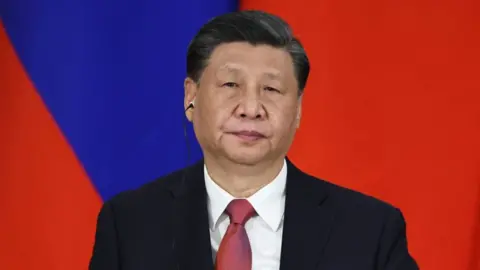China has sharply expanded nuclear arsenal, US says
 Getty Images
Getty ImagesChina has significantly expanded its nuclear stockpile over the past year and is now holding some 500 operational warheads, the US has said.
An annual report released by the Pentagon also said Beijing hoped to double its arsenal to over 1,000 warheads by 2030.
But it said China remained committed to a "no-first-strike" nuclear policy.
While the report said the rise exceeded projections, China's stockpile is still dwarfed by those of Russia and the US.
Russia has a nuclear arsenal of some 5,889 warheads and the US can field 5,244, according to the independent Stockholm International Peace Research Institute.
In 2021 the US Department of Defense estimated China had around 400 warheads.
"We're not trying to suggest a very large departure from where they [China] looked to be headed... but we are suggesting that they're on track to exceed those previous projections," a senior Pentagon official told reporters on Thursday, adding that the issue raised "a lot of concerns" for the US.
President Xi Jinping has declared China will field a "world-class military" by 2049. Since he came to power in 2012, he has sought to modernise the country's armed forces.
Thursday's Pentagon report said that China's drive to boost its nuclear arsenal was set to "dwarf previous attempts in both scale and complexity".
US officials said Beijing had probably completed the construction of three new clusters of missile sites in 2022. These fields include at least 300 new Intercontinental Ballistic Missile (ICBMs) silos, the report said.
ICBMs are ballistic missiles with a range greater than 5,500km (3,400 miles).
China's People's Liberation Army has also been seeking to develop ICBMs that would allow it "to threaten conventional strikes against targets in the continental US, Hawaii and Alaska", the US report found.
The analysis said that despite the growth of its nuclear stockpile, China remained "committed to a policy of 'deterrence' of an enemy first strike and 'counterstrike' when deterrence fails".
In a press briefing on Friday, foreign ministry spokeswoman Mao Ning said the US report "is full of prejudice and spreads the theory of the threat posed by China".
Ms Mao added that China had "always maintained our nuclear forces at the lowest level required for national security, and we have no intention of engaging in a nuclear arms race with any country".
Henry Boyd of the International Institute for Strategic Studies told the BBC the reported rate of increase did not look "hugely exceptional".
He also conceded that China was "moving slightly faster than estimated" towards its stated goal of 1,000 warheads.
Lyle Morris, a senior fellow at the Asia Society Policy Institute, told the BBC that developments such as hypersonic missiles were making China reconsider its second-strike policy, forcing the expansion of its stockpile.
Thursday's Pentagon report also noted that Beijing has "amplified diplomatic, political, and military pressure" against Taiwan over recent months.
Mr Xi has reportedly ordered his defence chiefs to develop the military capability to forcibly re-take the island by 2027.
A series of ballistic missile overflights of Taiwan, increased flights into its airspace and a series of military exercises around its waters have been ordered to destabilise the island, the Pentagon report added.
The findings come amid a low point in China-US diplomatic relations.
On Wednesday, Washington accused Chinese air force pilots of conducting hundreds of "coercive and risky" manoeuvres against US military planes in international air space over the Pacific.
The Pentagon - which also released videos and photos of the manoeuvres - said there had been 180 incidents since autumn 2021.
